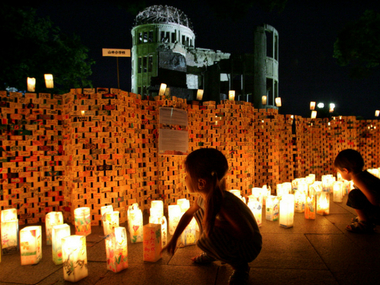Tokyo (Japan): A bell tolled on Monday in Hiroshima as Japan marked 73 years since the world’s first atomic bombing, with the city’s mayor warning that rising nationalism worldwide threatened peace. The skies over Hiroshima’s Peace Memorial Park were clear, just as they were on 6 August, 1945, when an American B-29 bomber dropped its deadly payload on the port city dotted with military installations, ultimately killing 140,000 people. [caption id=“attachment_4899181” align=“alignleft” width=“380”] Candles placed to honour atomic bomb victims in Hiroshima. Reuters[/caption] Hiroshima Mayor Kazumi Matsui, standing at the park near ground zero for the annual ceremony, made his annual call for a world without nuclear weapons and warned of the threat of rising nationalism. Without naming specific nations, he warned that “certain countries are explicitly expressing self-centred nationalism and modernising their nuclear arsenals.” They were “rekindling tensions that had eased with the end of the Cold War,” he added. He urged the abolition of nuclear weapons, in a year when president Donald Trump pledged to increase the US nuclear arsenal. “If the human family forgets history or stops confronting it, we could again commit a terrible error. That is precisely why we must continue talking about Hiroshima,” Matsui said. “Efforts to eliminate nuclear weapons must continue.” His call however highlighted Japan’s contradictory relationship with nuclear weapons. Japanese officials routinely argue that they oppose atomic weapons, but the nation’s defence is dependent on the US nuclear umbrella. Prime Minister Shinzo Abe, whose government has chosen not to participate in the UN Treaty on the Prohibition of Nuclear Weapons, said at the ceremony that Japan’s responsibility was to bridge the gap between nuclear and non-nuclear nations. “In recent years, it has become evident that gaps exist among countries about ways to proceed with nuclear arms reduction,” Abe told the ceremony, without directly referring to the treaty. “Our nation, while maintaining our (non-nuclear weapons) principles, will patiently work to serve as a bridge between the two sides and lead efforts by the international community” to reduce nuclear weapons, Abe said. Japan suffered two nuclear attacks by the US at the end of World War II — first in Hiroshima and then in Nagasaki three days later. The bombings claimed the lives of 140,000 people in Hiroshima and 74,000 people in Nagasaki. Barack Obama became the first sitting US president to visit Hiroshima in May 2016.
Japan marked its 73rd anniversary of atomic bomb attacks on Hiroshima and Nagasaki. The attack claimed over 2 lakh lives
Advertisement
End of Article


)

)
)
)
)
)
)
)
)



